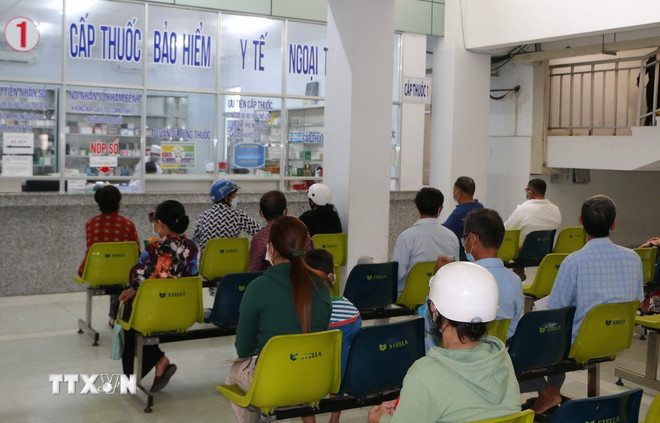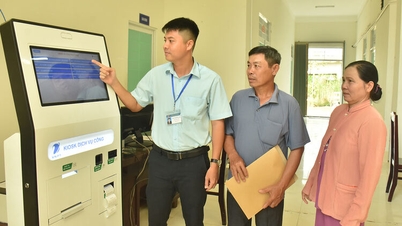After half a month of implementing Circular 26/2025/TT-BYT dated June 30, 2025 of the Ministry of Health "Regulations on prescriptions and prescription of pharmaceutical and biological drugs in outpatient treatment at medical examination and treatment facilities," which allows doctors to prescribe drugs for up to 90 days for some chronic diseases, many patients in Ho Chi Minh City are excited because they do not have to travel many times.
However, doctors said that prescribing long-term medication needs to be considered carefully and not all people with chronic diseases in 252 disease groups are prescribed longer-term medication than before.
Happy patient
During a routine check-up for type 2 diabetes on July 10, 2025, Ms. Le Thi Minh (65 years old, residing in Thanh My Loi ward) was surprised when the doctors at Le Van Thinh Hospital prescribed her medication for 2 months instead of 1 month as before. Having had diabetes for two years now, she has always strictly followed and followed the doctor's instructions, returning to the hospital every month for a check-up and to get medication.
“Every time I go for a check-up, I have to ask my children to help me look after the shop (Mrs. Minh sells groceries) and take a bus to the hospital. Both the check-up and waiting for the medicine takes me the whole morning. Many times I asked the doctor to prescribe me medicine for two months to reduce travel time, but the doctor did not agree because it was related to health insurance," said Ms. Minh.
Also prescribed medication for 3 months instead of 1 month as before by the doctors at District 11 Hospital, Mr. Vo Van Dien (75 years old, residing in Phu Tho ward, Ho Chi Minh City) - a patient with knee osteoarthritis happily shared: "I have osteoarthritis and it is very difficult to walk. Every time I have a check-up, my children have to take turns taking time off work to take me to the hospital. Now being given medication every 3 months like this is really good."
These are the patients who will benefit after Circular 26/2025/TT-BYT officially took effect from July 1. Doctor Tran Van Khanh, Director of Le Van Thinh Hospital, said that before July 1, the unit had disseminated the new regulations according to Circular 26 to all medical staff and is currently implementing them according to the regulations.
“When applied in practice, many patients are very happy because they reduce the time they have to travel for multiple check-ups, especially patients who are single, have difficulty moving, or are elderly,” said Dr. Tran Van Khanh.

Similarly, Dr. Pham Nguyen Anh Vu, Deputy Director of Binh Chanh Hospital, said that after 2 weeks of implementing Circular 26 of the Ministry of Health, many outpatients with chronic diseases at the hospital were happy and excited to be prescribed long-term medication. Currently, the number of outpatients with chronic diseases accounts for about 30-40% of the total number of visits and treatments at the hospital.
According to Mr. Vuong Anh Duong, Deputy Director of the Department of Medical Examination and Treatment Management (Ministry of Health), Circular No. 26/2025/TT-BYT is a timely adjustment, in line with the current trend of increasing chronic diseases in our country; at the same time, it creates favorable conditions for patients, especially people in remote, mountainous and island areas - where access to specialized medical services is still difficult. Previously, having to go to the hospital every month to get a prescription even though the disease was stable, really caused a lot of inconvenience and burden for patients and their families.
Be careful when prescribing long-term medication
In fact, when implementing Circular 26 of the Ministry of Health in recent days, besides the joy of some patients, medical facilities in Ho Chi Minh City encountered many cases of patients wondering why they, who also have chronic diseases, were not prescribed long-term medication like some other patients.
Being treated for high blood pressure at Le Van Thinh Hospital and thrombocytosis at the Blood Transfusion - Hematology Hospital, every month, Mr. Ly Phu Hung (66 years old, living in Phuoc Long ward, Ho Chi Minh City) has to have two check-ups.
“Both my hypertension and thrombocytosis have been stable for the past two years, but having to go for check-ups twice a month at two hospitals far apart is very time-consuming and expensive. When I heard that chronic diseases would be prescribed long-term medication, I was very happy. However, in early July 2025, when I went for a check-up, I was still only given a one-month supply of medication. I don't understand why I wasn't prescribed a longer term," Mr. Hung wondered.
Dr. Tran Van Khanh, Director of Le Van Thinh Hospital, said that prescribing medication for up to 90 days for chronic outpatients has been implemented, but not all patients are eligible for this. Only patients who are truly stable will be prescribed long-term medication, and must carefully consider factors such as drug interactions and the patient's health status. In fact, many patients, although stable, suffer from multiple diseases at the same time, so doctors must be more cautious to ensure safety.
According to Dr. Pham Nguyen Anh Vu, Deputy Director of Binh Chanh Hospital, at the unit, patients also wondered why they were not given long-term medication.
“We have to explain very carefully because not all cases can be prescribed long-term medication. This Circular has actually given the right to doctors to evaluate and decide how many days to prescribe medication for patients. However, patient safety is always our top priority,” said Dr. Pham Nguyen Anh Vu.

Agreeing with the need to be cautious when prescribing long-term medication, Dr. Tran Phu Manh Sieu, Director of Go Vap Hospital, said that not all patients can extend their follow-up appointments or prescribe long-term medication. Each patient must be carefully clinically evaluated by a doctor, ensuring stability and no complications before considering application. Particularly for cases where the drug dose is being adjusted, early stage treatment needs to be re-examined on time to perform tests, evaluate treatment response and adjust medication when necessary.
Previously, the Ministry of Health requested that this regulation not be applied widely. Doctors must fully assess the clinical condition and have a stable prognosis before prescribing a long-term prescription. At the same time, the Ministry of Health recommends that patients and their families also need to raise their sense of responsibility in complying with treatment, properly preserving drugs and monitoring for unusual signs to promptly return for examination when necessary./.
Source: https://www.vietnamplus.vn/can-can-nhac-than-trong-khi-cap-thuoc-bao-hiem-y-te-toi-da-90-ngay-post1049529.vnp



![[Photo] Parade to celebrate the 50th anniversary of Laos' National Day](/_next/image?url=https%3A%2F%2Fvphoto.vietnam.vn%2Fthumb%2F1200x675%2Fvietnam%2Fresource%2FIMAGE%2F2025%2F12%2F02%2F1764691918289_ndo_br_0-jpg.webp&w=3840&q=75)
![[Photo] Worshiping the Tuyet Son statue - a nearly 400-year-old treasure at Keo Pagoda](/_next/image?url=https%3A%2F%2Fvphoto.vietnam.vn%2Fthumb%2F1200x675%2Fvietnam%2Fresource%2FIMAGE%2F2025%2F12%2F02%2F1764679323086_ndo_br_tempimageomw0hi-4884-jpg.webp&w=3840&q=75)






































































































Comment (0)